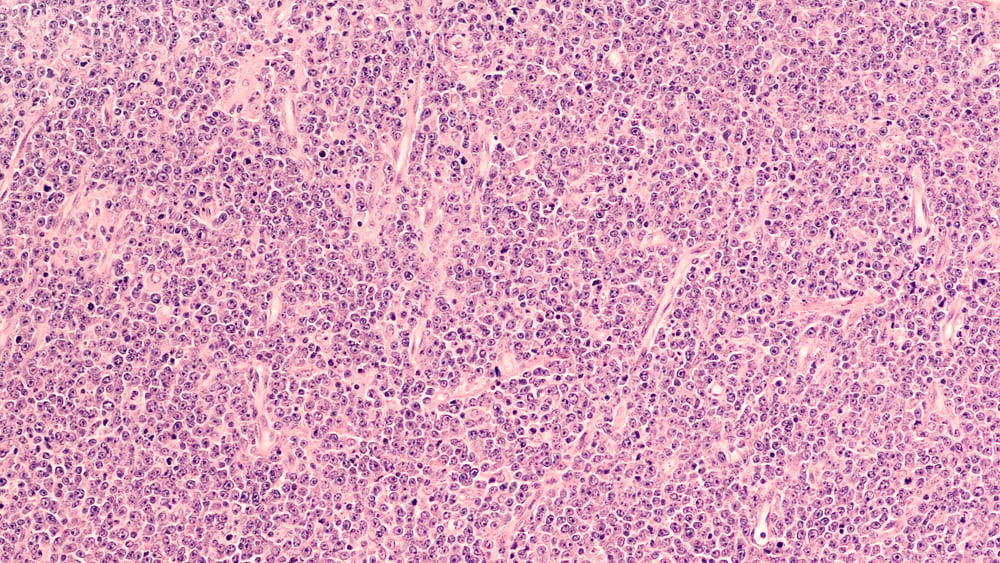Genentech, a member of the Roche Group, has announced the U.S. Food and Drug Administration (FDA) has approved Polivy (polatuzumab vedotin-piiq) in combination with Rituxan (rituximab), cyclophosphamide, doxorubicin and prednisone (R-CHP).
The approval covers the treatment of adult patients who have previously untreated diffuse large B-cell lymphoma (DLBCL), not otherwise specified (NOS) or high-grade B-cell lymphoma (HGBL) and who have an International Prognostic Index (IPI) score of two or greater.
This FDA decision converts the accelerated approval of Polivy in combination with bendamustine and Rituxan for relapsed or refractory (R/R) DLBCL after at least two prior therapies to regular approval.
DLBCL is an aggressive, hard-to-treat disease and is the most common form of non-Hodgkin’s lymphoma in the U.S. Approximately 31,000 people in the U.S. are projected to be diagnosed with DLBCL in 2023. Limited progress has been made in improving patient outcomes in previously untreated DLBCL over the last two decades. While many patients are responsive to initial treatment, as many as four in 10 people with DLBCL do not respond or relapse. For people who undergo initial treatment with the standard of care, Rituxan plus cyclophosphamide, doxorubicin, vincristine and prednisone (R-CHOP), most relapses occur within two years of starting treatment, and the majority of those who require subsequent lines of therapy have poor outcomes.
“It has been nearly 20 years since a new treatment option has become available to people newly diagnosed with diffuse large B-cell lymphoma,” said Levi Garraway, chief medical officer and head of Global Product Development.
“Today’s decision from the FDA to approve Polivy in combination with R-CHP in this setting brings a much-needed new treatment option which may improve outcomes and bring other benefits to many patients with this aggressive lymphoma.”
Genentech sees ‘significant improvement’
The FDA approval of Polivy plus R-CHP for the first-line treatment of DLBCL is based on pivotal data from POLARIX, an international phase III, randomized, double-blind, placebo-controlled study that demonstrated a statistically significant and clinically meaningful improvement in PFS compared to R-CHOP.
The risk of disease progression, relapse or death was reduced by 27% with Polivy plus R-CHP compared with R-CHOP.
The approval follows the FDA Oncologic Drugs Advisory Committee (ODAC) vote of 11 to 2 in favor of Polivy in combination with R-CHP for previously untreated DLBCL. More than 70 countries have approved this Polivy combination for the treatment of adult patients with previously untreated DLBCL, including in the EU, U.K., Japan, Canada and China. Polivy in combination with R-CHP was recently added to the National Comprehensive Cancer Network (NCCN) Clinical Practice Guidelines in Oncology (NCCN Guidelines) as a category 1, preferred regimen for first-line DLBCL.
Polivy in combination with bendamustine and Rituxan is currently approved in more than 80 countries worldwide for the treatment of adults with relapsed or refractory (R/R) DLBCL after one or more prior therapies, including in the U.S.
Genentech said it is continuing to explore areas of unmet need where Polivy has the potential to deliver additional benefit, including in ongoing studies investigating combinations of Polivy with the company’s CD20xCD3 T-cell engaging bispecific antibodies Lunsumio (mosunetuzumab-axgb) or glofitamab.
Trials include the phase III SUNMO study in combination with Lunsumio in patients with R/R DLBCL and the phase III POLARGO study with Rituxan in combination with gemcitabine and oxaliplatin in patients with R/R DLBCL.
About diffuse large B-cell lymphoma
Diffuse large B-cell lymphoma (DLBCL) is the most common form of non-Hodgkin’s lymphoma (NHL), accounting for about one in three cases of NHL. DLBCL is an aggressive (fast-growing) type of NHL. While it is generally responsive to treatment in the frontline, as many as 40% of people will relapse or have refractory disease, at which time salvage therapy options are limited and survival is short. Approximately 160,000 people worldwide are estimated to be diagnosed with DLBCL each year.
About Genentech’s Polivy (polatuzumab vedotin-piiq)
Genentech’s Polivy is a first-in-class anti-CD79b antibody-drug conjugate (ADC). The CD79b protein is expressed specifically in the majority of B cells, an immune cell impacted in some types of NHL, making it a promising target for the development of new therapies. Polivy binds to cancer cells such as CD79b and destroys these B cells through the delivery of an anti-cancer agent, which is thought to minimize the effects on normal cells.
Polivy is being developed by Genentech using Seagen ADC technology and is currently being investigated for the treatment of several types of NHL.
Genentech’ supplemental Biologics License Application for Polivy was approved by the FDA last August.





